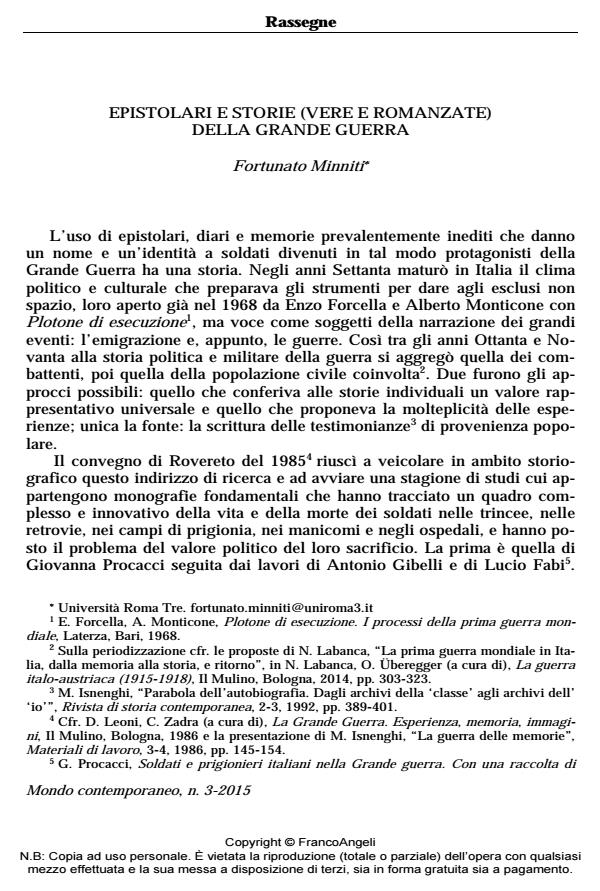Letters and stories (true and novelized ones) from the Great War,
Journal title MONDO CONTEMPORANEO
Author/s Fortunato Minniti
Publishing Year 2016 Issue 2015/3
Language Italian Pages 13 P. 107-119 File size 63 KB
DOI 10.3280/MON2015-003004
DOI is like a bar code for intellectual property: to have more infomation
click here
Below, you can see the article first page
If you want to buy this article in PDF format, you can do it, following the instructions to buy download credits

FrancoAngeli is member of Publishers International Linking Association, Inc (PILA), a not-for-profit association which run the CrossRef service enabling links to and from online scholarly content.
New contributions to the history of the Great War drawn from popular writings (letters, diaries and memoirs) can be found in five recent works written, respectively, by Antonio Gibelli, Quinto Antonelli, Nicola Maranesi, Emilio Franzina and Alessandro Baricco. In different ways, all of them pursue the same goal: entrusting the protagonists with the telling of their own experiences. The works of Gibelli, Antonelli and Maranesi touch a number of common subjects and identify them, making the creation of a history of life at war possible. At the same time, they take distance from the previous historiography bringing out popular sources, since, for the first time, these authors let the protagonists of this new history come forward and talk. At times, the voices in this chorus sing even louder than the three historians, yet the authors are still able to intervene and regulate the pace of the narration. They do so similarly to what both Franzina and Baricco do in their own works, though the former is not a novelist and the latter is not a historian. Both of them, however, successfully try to reconstruct and analyse the happenings of war through creativity. The stories told by the protagonists of these works are plausible and, above all, they are shared by millions of soldiers; they have been confirmed by historical evidence; they have been thoroughly and critically examined by historical research in the last few years. In this kind of research there were expected results for both the historian and the novelist that were all achieved: the historian has broadened the meaning of his research, based on the real experience of war; the novelist has gained a chance to disseminate a sharper version of the origins of such an evocative historical event as Caporetto.
Keywords: Popular writings, Great War, unknown soldier, novel and war, historiography of the First World War, letters
Fortunato Minniti, Epistolari e storie (vere e romanzate) della grande guerra in "MONDO CONTEMPORANEO" 3/2015, pp 107-119, DOI: 10.3280/MON2015-003004